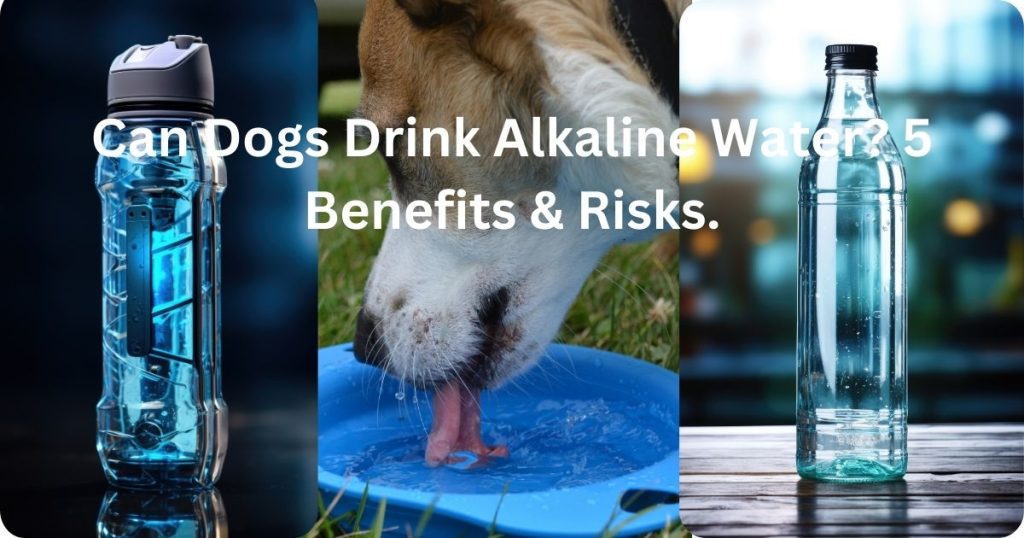In This Article
ToggleHave you ever wondered, can dogs drink alkaline water? With alkaline water gaining popularity for its potential health benefits in humans, it’s natural to question if it’s safe—or even beneficial—for our furry friends. As a dog lover, I wanted to dig deeper into this topic to give you clear, vet-backed answers. Is alkaline water a hydration hero or a risky choice for your pup? Let’s explore the facts together and find out what’s best for your dog’s health. Keep reading to uncover the truth!
What Is Alkaline Water?
Okay, let’s start with the basics—what exactly is alkaline water? Imagine regular tap water as a neutral player in a game. It’s just there, doing its job, with a pH level of around 7 (that’s the scale we use to measure how acidic or basic something is). Now, alkaline water is like the superstar teammate with a higher pH level, usually between 8 and 9. This makes it less acidic and more, well, basic (but in a good way!).
So, how does water become alkaline? Sometimes, it’s naturally alkaline because it picks up minerals like calcium and magnesium as it flows over rocks. Other times, it’s made alkaline through a process called electrolysis, where machines split water molecules to increase their pH level. Think of it like giving water a little upgrade!
But why does this matter? Well, some people believe that drinking alkaline water can help balance the acidity in our bodies, kind of like how eating veggies helps balance out too much junk food. And while humans might enjoy its potential benefits, the big question is: Can dogs drink alkaline water too? Let’s find out!
Fun Fact: Alkaline water tastes a bit smoother than regular water because of its higher pH. Some people even say it feels “softer” when they drink it. Fancy, right?
Now that you know what alkaline water is, let’s dive into whether it’s safe for your pup!
can dogs drink alkaline water?

Alkaline water might sound like a fancy upgrade for your pup, but is it safe? The short answer: it depends on your dog’s health and how much they drink. While some dogs handle it just fine, others might experience digestive issues or kidney strain.
Is Alkaline Water Safe for All Pets?
Not all pets are the same when it comes to special water. Cats are more sensitive to changes in water than dogs. While a little bit of alkaline water probably won’t hurt most pets, we don’t know the long-term effects yet. If your dog is healthy and eats well, they should be fine. But if they have kidney problems, it’s best to be cautious with alkaline water.
Is Alkaline Water Hard on the Kidneys?
The kidneys work hard to maintain a proper pH balance in the body. Drinking too much alkaline water might force the kidneys to overcompensate, which could be risky for dogs already dealing with kidney disease. If your dog is healthy, occasional alkaline water likely won’t hurt, but for dogs with kidney issues, it’s best to stick with vet-recommended water sources.
Potential Benefits of Alkaline Water for Dogs
Some pet owners believe alkaline water offers health perks for dogs, but does it really? While research is limited, some experts suggest it may help with hydration, digestion, and overall well-being—but only in the right situations.
Does Alkaline Water Have Health Benefits for Dogs?
Alkaline water has a higher pH than regular water, which some claim helps balance acidity in the body. For dogs, this could mean better hydration, improved digestion, and potential anti-inflammatory effects. However, these benefits are mostly anecdotal, with little scientific backing.
Acid Neutralization and Digestive Support
Some people think alkaline water can help dogs with upset stomachs because it might reduce stomach acid. However, dogs are pretty good at keeping their stomach acid levels balanced. So, unless your dog has specific digestive issues, alkaline water might not make a big difference.
Increased Energy Levels and Hydration
Hydration is essential for keeping dogs active and energetic. Since alkaline water is often enhanced with minerals, it might help improve water absorption and hydration efficiency. This could be useful for high-energy dogs or those prone to dehydration.
Improved Skin Health and Coat Condition
Some owners claim their dog’s skin and coat look healthier after switching to alkaline water. The idea is that better hydration leads to less dryness and itchiness. While hydration is important for skin health, no strong evidence proves alkaline water works better than fresh, clean water.
Joint Health and Mobility
Dogs with arthritis or joint issues might benefit from better hydration and mineral intake, which alkaline water may provide. Some believe it can help reduce inflammation, but again, there’s no conclusive research proving it makes a real difference.
Risks and Considerations of Alkaline Water for Dogs
Even though alkaline water might have some benefits, it’s not for every dog. While most healthy dogs can handle a little bit of it, some might experience tummy troubles, extra stress on their kidneys, or even develop bladder stones. It’s important to understand the potential drawbacks before switching your dog’s water.
Can Alkaline Water Cause Bladder Stones in Dogs?
One major concern is the risk of bladder stones. A dog’s urinary pH needs to stay balanced to prevent crystal and stone formation. If alkaline water raises the pH too much, it could create the perfect environment for certain types of stones to develop. Dogs already prone to bladder or kidney stones should avoid alkaline water completely.
Who Should Not Drink Alkaline Water?
Not all dogs love special water.” Just like people, not all dogs react the same way to alkaline water. Dogs with kidney problems, bladder issues, or sensitive tummies might not like the change in water. If your dog starts having tummy aches, diarrhea, or unusual bathroom habits after drinking alkaline water, it’s a sign their body isn’t happy. It’s best to stick to plain, clean water for puppies, senior dogs, and any dog with health concerns.
Insufficient Extended Research on Alkaline Water for Canines
There’s limited scientific research on how alkaline water affects dogs long-term. While some owners swear by it, veterinarians caution against assuming it’s better than regular water. Since a dog’s body is already designed to regulate pH levels naturally, altering that balance could have unintended consequences.
Always Consult a Veterinarian First
Before changing your dog’s water, it’s best to chat with your vet. They can tell you if alkaline water is a good choice for your dog based on their health. When it comes to keeping your dog hydrated, the best option is always fresh, clean water. Don’t get caught up in trends or unproven claims.
How to Give Your Dog Alkaline Water in a Safe Way
If you’re thinking about giving your dog alkaline water, slow and steady is the way to go. A sudden switch could upset their stomach or cause unwanted changes in hydration levels. Here’s the proper method to do things.
How Much Alkaline Water Should Pets Drink?
Dogs don’t need fancy water to stay hydrated. If you want to try alkaline water, start by adding a tiny bit to their regular water. Watch how they do. If they seem fine, you can slowly increase the amount of alkaline water. But remember, don’t replace all their water with it.
Step 1: Consult Your Veterinarian
Before making any changes, ask your vet if alkaline water is a good fit for your dog. If your pup has kidney issues, urinary problems, or a sensitive stomach, they may advise against it.
Step 2: Consider Your Dog’s Health Status
Healthy dogs are more likely to handle alkaline water without issues, but dogs with pre-existing conditions might struggle to process it. Pay extra attention if your dog has kidney disease or a history of bladder stones.
Step 3: Gradual Transitionhttps
Never swap out your dog’s water all at once. Start with 25% alkaline water mixed with 75% regular water, then slowly adjust the ratio over a few weeks. This gives their body time to adapt.
Step 4: Monitor Digestive Health
Watch for changes in your dog’s energy, appetite, and feces. If you notice diarrhea, bloating, or any discomfort, go back to regular water. Some dogs may struggle with the pH change.
Step 5: Watch for Behavioral Changes
If your dog drinks less water than usual after the switch, they might not like the taste. Hydration is more important than pH levels, so if they’re avoiding their bowl, stick to what they prefer.
Step 6: Maintain Hydration Balance
Alkaline water should only be a small part of your dog’s overall hydration plan. Fresh, clean water should always be available, and you should never force your dog to drink something they don’t like.
Alternatives to Alkaline Water for Dogs
If you’re unsure about giving your dog alkaline water, there are plenty of other safe and healthy options. The best drinking water for dogs is clean, fresh, and free from harmful contaminants. While alkaline water is a debated choice, some alternatives provide hydration without the risks.
What Is the Best Drinking Water for Dogs?
The best water for your dog depends on purity, mineral content, and safety. In general, filtered water, spring water, and clean tap water are the top choices. Each has its pros and cons, but the goal is always proper hydration without unnecessary additives.
Spring Water: A Natural Option
Spring water is often rich in natural minerals that can benefit dogs. It’s free from chlorine and artificial additives, making it a good alternative to alkaline water. However, not all bottled spring water is the same, so always check for added chemicals.
Filtered Water: Safe and Reliable
Filtered water removes contaminants like chlorine, heavy metals, and bacteria, making it one of the safest choices for dogs. If your tap water has a strong chlorine taste or possible pollutants, using a water filter can improve quality without altering the pH too much.
Can Dogs Drink Distilled Water?
Distilled water is free of minerals, which means it lacks essential nutrients that dogs get from natural water sources. While it won’t harm your dog in small amounts, drinking only distilled water over time could lead to electrolyte imbalances. It’s best used occasionally rather than as a primary water source.
Can Dogs Drink Electrolyte Water?
Electrolyte water can help with hydration during illness, heat exhaustion, or intense activity. However, some electrolyte drinks made for humans contain high levels of sodium or artificial sweeteners like xylitol, which can be toxic to dogs. If your dog needs electrolytes, it’s safer to use vet-approved hydration solutions.
Tap Water: Is It Safe?
Most tap water in developed areas is safe for dogs, but quality varies depending on location. Some tap water contains chlorine, fluoride, or heavy metals that may not be ideal for long-term health. If you’re concerned, using a simple water filter can make tap water safer.
Which Water Should You Choose?
For most dogs, fresh, filtered, or spring water is the best option. Alkaline water isn’t a necessity and distilled and electrolyte water should only be given in specific situations. The most important thing? Make sure your dog always has access to clean, fresh water—no matter the type.
Final Thoughts: Should Your Dog Drink Alkaline Water?
Alkaline water has some potential benefits, like better hydration and acid neutralization, but it’s not a must-have for dogs. Some pups handle it well, while others may experience digestive issues or risks like bladder stones. The best advice? Ask your vet if it’s a good idea for your dog. Have you tried alkaline water with your dog? Did they love it or leave it? Share your experience in the comments below!







